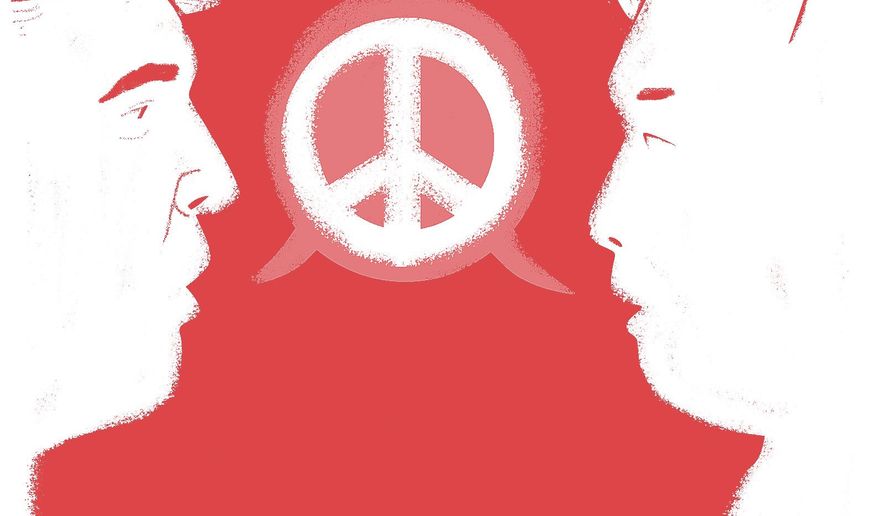OPINION:
It’s convenient for North Korea to claim that its nuclear weapons program is in response to the hostile policy of the United States. I heard this in 2003, when I was the special envoy for negotiations with North Korea. I heard this last October from the nation’s vice foreign minister during unofficial discussions in Kuala Lumpur. And we heard it again last week, when North Korea’s director general of U.S. affairs at their Ministry of Foreign Affairs claimed that North Korea would retain its nuclear weapons because of the U.S. hostile policy toward North Korea.
North Korea maintains that its nuclear weapons are a deterrent to the United States; that with nuclear weapons, the U.S. would not invade or seek to decapitate the leadership in Pyongyang. It cites the annual joint military exercises with South Korea as proof that U.S. policy toward North Korea is regime change.
North Koreans know the U.S. has spent the last 25 years trying to find a negotiated, peaceful resolution of issues with them. They know that starting in 1994, the Agreed Framework provided North Korea with heavy fuel while two light water reactors were being built for civilian energy, in return for the dismantlement of its plutonium nuclear weapons reactor in Yongbyan.
North Korea also knows that with the 1999 “Perry Process” led by Secretary of Defense William Perry, Secretary of State Madeleine Albright visited Pyongyang and spent over 16 hours of negotiations with Kim Jong-il, dealing with a missile moratorium and a path to normal bilateral relations. They also know that in September 2005, Kim Jong-il, Kim Jong-un’s father, permitted his negotiators to sign a Joint Statement that committed North Korea to complete, verifiable and irreversible denuclearization, in return for security assurances, economic development assistance and a path to normal relations with the U.S.
North Korea knows that its claim of a hostile U.S. policy is a pretext for justifying its pursuit of nuclear weapons. This desire to be a nuclear weapons state goes back to the 1960s, when China entered the club of nuclear weapons states and Kim Il-sung, Kim Jong-un’s grandfather, also sought nuclear weapons for North Korea. This desire to have nuclear weapons persists to this day. And as justification, North Korea cites a hostile U.S., despite U.S. efforts over the past 25 years to peacefully resolve issues with North Korea and move toward a normal bilateral relationship.
I’m convinced that those advising Kim Jong-un believe they will eventually succeed in getting the U.S. and others to accept North Korea as a nuclear weapons state. Currently, we assess that North Korea has nuclear weapons. We will not, however, accept North Korea as a nuclear weapons state, regardless of any attempt to put a cap on the number of weapons they retain.
There are compelling reasons why we should not accept North Korea as a nuclear weapons state. A nuclear North Korea will encourage other countries in the region to seek their own nuclear weapons capability, regardless of U.S. extended nuclear deterrence commitments. There’s no doubt that South Korea, Japan, Taiwan and others in East Asia will seek their own nuclear weapons, thus creating a nuclear arms race in the region. It’s also possible that North Korea, which provided Syria with a plutonium nuclear reactor at Al Kibar that Israeli bombed in 2007, would sell a nuclear weapon or fissile material to a rogue state or terrorist organization.
Another reality is the accidental use, through miscommunication or faulty information, of a nuclear weapon that could spark nuclear conflict on the Korean Peninsula and in the region. In short, accepting North Korea as a nuclear weapons state, regardless of their protestations of being a responsible actor, would be a monumental mistake.
We are now at an inflection point with North Korea on the cusp of becoming an existential nuclear threat to the U.S. It’s important, therefore, that North Koreans be convinced that it is in their interest to immediately halt any further missile launches and nuclear tests and enter into exploratory discussions with the U.S., to determine if formal multilateral negotiations are possible. If we don’t talk, and if North Korea continues to launch missiles and conduct nuclear tests, then purposeful or accidental military conflict on the Korean Peninsula becomes a real possibility.
Unconditional discussions and a return to multilateral negotiations should be our immediate objective. It would freeze North Korea’s nuclear and missile programs and address North Korea’s security concerns, to include an eventual peace treaty and scaling back joint military exercises. In return, North Korea eventually would agree to complete, verifiable and irreversible denuclearization, similar to their 2005 Joint Statement commitments. This process may take years, but it will be worth it.
If North Korea refuses to enter into these discussions, and continues to launch missiles and conduct nuclear tests, then the U.S. and its allies should continue to implement an aggressive containment and deterrence policy, with additional missile defense deployments, upgraded joint military exercises with South Korea, eventually to also include Japan, and additional powerful sanctions. Hopefully, this will not be necessary if North Korea enters into substantive discussions with the U.S.
• Joseph R. DeTrani is a former special envoy for negotiations with North Korea. The views are the author’s and not those of any government agency or department.




Please read our comment policy before commenting.